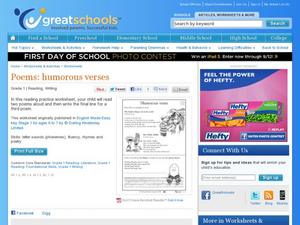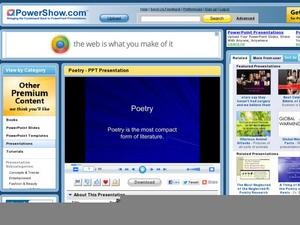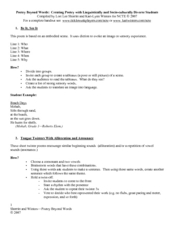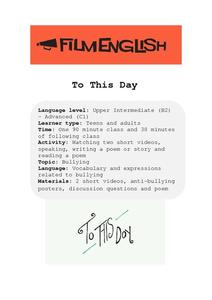K12 Reader
Mom Will Find the Fox
Fox, box, shop, got... what do all of these words have in common? The short /o/ sound! Give your class some practice with the short /o/ poem by reading the poem on this worksheet. Learners also answer three included reading comprehension...
K12 Reader
He Must Take the Bus
Build your youngsters' knowledge of the short /u/ sound with a quick exercise. Class members read a brief poem designed to include many words with the short /u/ sound and then answer three reading comprehension questions about the...
K12 Reader
My First Hat
Practice the short /a/ sound with your class. To get it down, they read a short poem that supplies many examples of words that include the short /a/ sound. Once they are finished reading, learners answer three reading comprehension...
K12 Reader
She Needs Less Shell
Supply your pupils with some practice of the short /e/ sound. They read brief poem that includes several examples of words that include this sound. Once they are finished reading, class members respond to three reading comprehension...
Poetry4kids
How to Write a Funny Epitaph Poem
What can happen if you eat too much cafeteria food? Or wear dirty clothes every day? Or talk back to your mother? Use a lesson on humorous poems as a way for students to practice silly rhymes as fictional epitaphs.
University of North Carolina
Poetry Explications
Explication may sound like a fancy word, but it's just a fancy way to say analysis. Using a handout on poetry explications, part of a larger series on specific writing assignments, writers learn how to break down and analyze a poem. The...
Poetry4kids
How to Write an Apology Poem
Put a silly spin on making amends with an apology poem. Budding poets think of a time they were made to apologize although they didn't mean it. They then turn their experience into a poem that offers details and ends with an explanation...
Poetry4kids
How to Write a Tanka Poem
Take your haikus to the next level with tanka poems, another form of Japanese poetry that regulates the length and rhythm of each line by syllables. Young writers read the explanation, examples, and tips for tanka poems before writing...
K12 Reader
The Kid Will Win a Ship
Which word included the short /i/ sound: pirate or ship? Work on the short /i/ sound with your class by using the short poem provided here. Class members read the poem and answer three reading comprehension questions.
K12 Reader
Poetry Uses Rhyme
It's rhyme time! After reading a short article about poems that rhyme, kids take the time answer questions about the message of the passage.
Poetry4kids
How to Write a Free Verse Poem
Budding poets compose an original free verse poem. Encouraged to use personification and alliteration, scholars read over three tips and examples then try their hand at drafting a poem of their own style.
Curated OER
Comparing Poems
Young literary analysts compare two poems by the same author. Readers look for slant rhyme, observe the beat and rhythm of each, and search for repeated vowel sounds. After re-reading, they observe the lack of punctuation and the stanza...
Poetry4kids
Evoking the Senses in a Poem
Budding poets choose a topic for a sensory-filled poem. Authors describe that topic using detailed language based on the five senses. Then, switch the senses to create a fanciful poem intended to add a touch of fun to the objective.
Curated OER
Poems: Humourous Verses
First grade is a great time to build strong reading skills. Here are three short rhyming poems or common nursery rhymes that are intended to help boost reading fluency. Because most children know these rhymes, they will have an easier...
Houghton Mifflin Harcourt
Surprise!: English Language Development Lessons (Theme 2)
Surprise! is the theme of this series of ESL lessons. Cover an array of topics such as where we live, different times of day, shapes, the city and the country, what we do for fun, jobs, and games, all while practicing how to express...
Houghton Mifflin Harcourt
Family and Friends: English Language Development Lessons (Theme 4)
Family and Friends is the theme of a unit consisting of English language development lessons. Reinforce language proficiency, particularly in family vocabulary, basic needs, feelings, short vowel sounds, blending, reading high frequency...
Curated OER
Poetry: The Most Compact Form of Literature
Introducing or need to review literary devices and terms for a study of poetry? Though text heavy, the explanations and examples of key poetic devices will provide learners with the vocabulary they need to discuss and craft poems.
Curated OER
Poetry Beyond Words: Creating Poetry with Linguistically Diverse Students
Models of and directions for how to write 20 different types of poems are featured in an NCTE resource. The introduction to each form highlights the embedded concepts. For example, tongue twisters encourage poets to use alliteration and...
Curated OER
Poetry and Hip Hop
High schoolers compare and contrast the genres of poetry and hip-hop. They view a poetry slam and write about it in their journals. Learners view a Lauryn Hill music video and respond to it in their journals. They compare and contrast...
Curated OER
So Much Depends Upon...Sixteen-Word Imagery Poems Inspired by Love that Dog by Sharon Creech
After reading Love That Dog by Sharon Creech (and possibly shedding a few tears), middle schoolers work on their own sixteen-word poems with a Six Trait writing activity. They focus on word choice in this activity to capture an...
Film English
To This Day
Bring bullying out into the open with an involved lesson surrounding the animated version of Shane Koyczan's spoken word poem "To This Day." Class members discuss images related to bullying and watch the video without sound. They write a...
Curated OER
War Literature
Working in groups, young historians review a war poem written by Stephen Crane. After reviewing the poem, they present an oral interpretation of the poem and hold a panel discussion about their analysis. The panel is made up of five or...
College of the Canyons
Free Verse
Free verse poetry is often regarded as poetry without structure, but in reality, it is a poetic form that adheres to its own poet's thought and breath patterns. Delve into the rules and famous examples of free-verse poetry with a short...
Poetry4kids
Alliteration and Assonance Lesson Plan
Scholars analyze the poem My Puppy Punched Me in the Eye by Ken Nesbitt in order to locate examples of alliteration and assonance. After reading the poem, alliterative words are underlined and assonant words are circled.

























